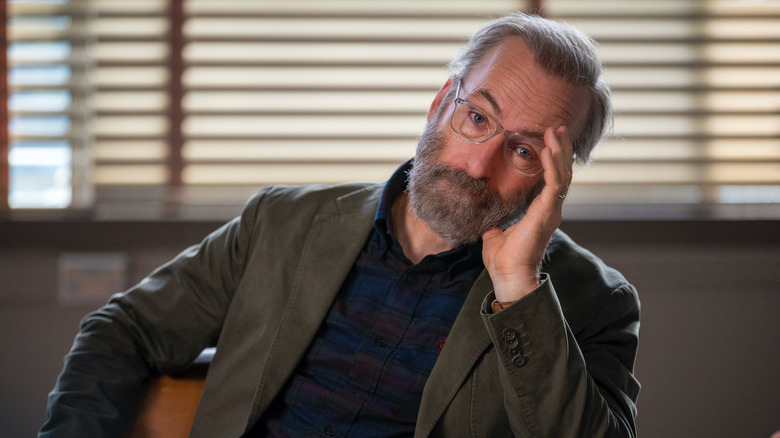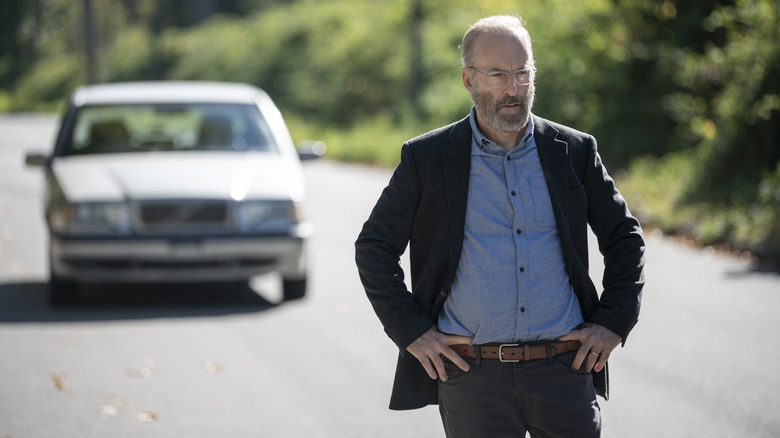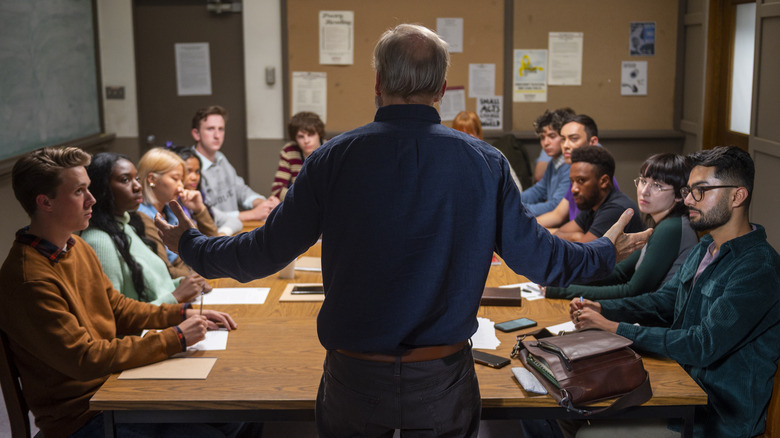Lucky Hank Review: Bob Odenkirk Undergoes A Midlife Crisis In A Series Struggling To Find Itself [SXSW 2023]
Time for some inside baseball: reviewing TV can be tricky. When I review a movie, I'm always given a full picture; a beginning, middle, and end. TV is a different beast, because most of the time, networks will only send out a handful of episodes to review instead of a full season. And as almost anyone can tell you, a lot of TV shows take a little time to get to that sweet spot. It's very rare to have a show that's firing on all cylinders right out of the gate — unless the show is an episodic sitcom, you need time to spend with the characters as they deal with their various ever-unfolding conflicts.
All of this is to say that it's not an easy task to review "Lucky Hank," Bob Odenkirk's return to both TV and AMC. Only two episodes were provided for review, and as a whole, they don't paint much of a picture. Instead, based on these two episodes, "Lucky Hank" feels like a series in search of itself. Perhaps that's fitting, because the same can be said of the main character, Odenkirk's William Henry "Hank" Devereaux, Jr., a sad-sack college professor in the midst of a midlife crisis. Like the show, Hank is searching for ... something. But what that something is remains illusory. The character talks a lot about how he wants to finally write his second novel, but he can't seem to crack it.
Making writers cinematic isn't an easy feat, which is saying something because so many film and TV writers write stuff about writing stuff. So much so that the tropes have become cliched — the struggle to find the right words; the agony of sitting in front of a blank, white word processor page, dying for the words to come. That's only one of Devereaux's struggles, though. In general, he seems to struggle with everything. He's unsatisfied with his life, his career, his existence. He is perpetually miserable, so much so that it's a wonder he seems to be in a stable marriage to his wife Lily (Mireille Enos, in a severely underdeveloped role ... at least in these two episodes). Can Hank pull himself out of this existential tailspin? Or is he doomed to spend the rest of his days in perpetual misery?
A midlife crisis
The series begins with Odenkirk's Hank Devereaux clearly at the end of his rope. During one of his classes at what he considers a mediocre college in a mediocre small town, Hank snaps and insults the work of one of his students, a talentless rich kid who sees himself as a great writer when he's clearly anything but. This inciting incident triggers a kind of chain reaction, resulting in Hank being removed as chair of the English department — only to be reinstated almost immediately through a series of unlikely events.
The brief moment where Devereaux thought he was going to lose his job offered a possible glimmer of light — coupled with the idea of taking his wife, packing up, and moving out of this dead-end town. But as Lily points out, Hank may complain a lot about his life and career, but he's also stuck. It's as if his misery is all he has, and if he starts a new life, he'll be leaving that all behind. He needs his grumpiness to survive.
In the midst of all this, Hank struggles to write a second book. His first book came out years ago, and Hank has grown convinced that the book isn't very good and that it only got published because of his famous father. Worse, he worries he'll never be able to write again. To further complicate things, renowned short story writer George Saunders (played by Brian Huskey) arrives to give a talk to the school, with Hank set to serve as moderator. Hank feels eclipsed by the more successful, more popular Saunders, and his resentment only grows.
Odenkirk is great even if the show isn't (yet)
Odenkirk, who spent a large chunk of his career in comedy, proved his serious acting chops with his work on "Breaking Bad" and then "Better Call Saul," the latter of which proved he could brilliantly carry a series with heft. The actor is great again here, leaning into Hank's perpetual grouchiness while playing up the character's inner turmoil over, well, everything. Unfortunately, the series, developed by Paul Lieberstein and Aaron Zelman and adapted from the Richard Russo novel "Straight Man," doesn't seem confident in letting Odenkirk's acting do the heavy lifting. To accentuate the proceedings, a sporadic, entirely needless narration is thrown in, with Hank waxing on various topics as he goes about his day.
Narration can work despite what some screenplay "experts" tell you, but here it's a crutch; a hindrance. It gives you the impression that the series is entirely unsure of itself, and rather than let the character's actions speak for themselves, the clunky narration is thrown in to guide things along. One can sense there's a much better version of the series that axes the narration entirely and lets the series unfold at its own pace.
But again: I'm basing all of this off of two episodes. For all I know, episode three of "Lucky Hank" is some sort of revelation that will blow minds and touch hearts. But I can only work with what I'm given, and what I was given here was lacking. I'll stick with "Lucky Hank" because of Odenkirk, and Odenkirk alone. I can only hope the series finds its footing as it goes along, or else it might be doomed to wallow in uncertainty just like its main character.
"Lucky Hank" premieres March 19, 2023, on AMC.


